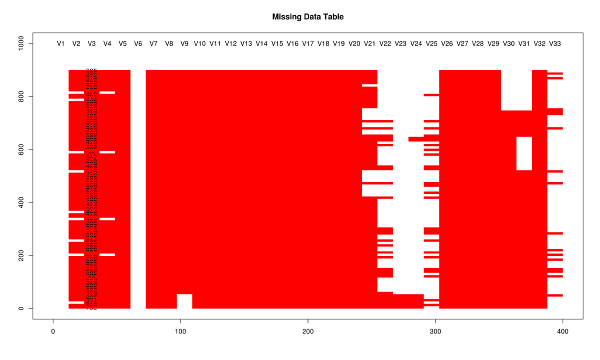Sometime ago I saw this example of a method for assessing missing data in a large data frame http://flowingdata.com/2014/08/14/csv-fingerprint-spot-errors-in-your-data-at-a-glance/
I asked my colleague Grant about doing this in R and he whipped up the following code to generate such an image:

Code
misstable <- function(atable){
op <- par(bg = "white")
plot(c(0, 400), c(0, 1000), type = "n", xlab="", ylab="",
main = "Missing Data Table")
pmin=000
pmax=400
stre=pmax-pmin
lnames=length(atable)
cstep = (stre/lnames)
for(titles in 1:lnames){
text((titles-1) * cstep+pmin+cstep/2,1000,colnames(atable)[titles])
}
gmax=900
gmin=0
gstre=gmax-gmin
rvec = as.vector(atable[ [ 1 ] ])
dnames=length(rvec)
step = gstre / dnames
for(rows in 1:dnames){
text(30,gmax - (rows-1)*step-step/2,rvec[rows])
ymax=gmax - (rows-1)*step
ymin=gmax - (rows)*step
for(col in 2:lnames-1){
if(atable[rows,col+1] == F){
tcolor = "red"
}
if(atable[rows,col+1] == T){
tcolor = "white"
}
rect((col) * (stre/lnames)+pmin, ymin, (col+1) * (stre/lnames)+pmin,
ymax,col=tcolor,lty="blank")
}
}
}
require(grDevices)
# Make a quick dataframe with true/false representing data availability
locs=c("Australia","India","New Zealand","Sri Lanka","Uruguay","Somalia")
f1=c(T,F,T,T,F,F)
f2=c(F,F,F,T,F,F)
f3=c(F,T,T,T,F,T)
atable=data.frame(locs,f1,f2,f3)
atable
#Draw the table.
misstable(atable)





